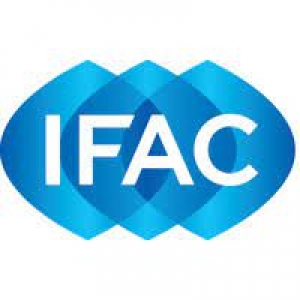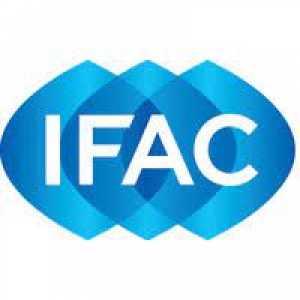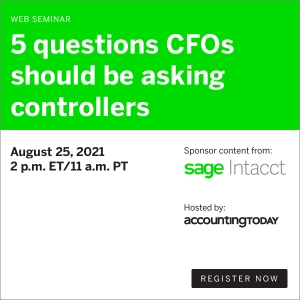عرض العناصر حسب علامة : المديرين الماليين
ندوة عبر الإنترنت استكشاف الدور الحاسم للمدراء الماليين وفرق التمويل في التحول المناخي
معلومات إضافية
- البلد عالمي
- نوع الفعالية مجانا
- بداية الفعالية الأربعاء, 21 سبتمبر 2022
- نهاية الفعالية الأربعاء, 21 سبتمبر 2022
- التخصص محاسبة ومراجعة
- مكان الفعالية اونلاين
يدعو الاتحاد الدولي للمحاسبين قادة الأعمال العالمية إلى تعزيز الثقة وخلق قيمة مستدامة من خلال تبني عقلية متكاملة
تسلط مبادرة الاتحاد الدولي للمحاسبين الجديدة الضوء على الدور الحاسم للمدراء الماليين والوظائف المالية في تمكين عقلية متكاملة
مواكبة الدور المتطور للمدير المالي
تطور دور المدير المالي في العام الماضي أكثر مما كان عليه في السنوات الخمس الماضية، بسبب التحول الرقمي الهائل الذي حدث استجابة للوباء. بينما تستمر الأرقام -من تلك المرتبطة بمقاييس الأداء إلى المحصلة النهائية -في أن تكون محور التركيز الأساسي، يُطلب من المديرين الماليين اليوم لعب دور رئيسي في قيادة الأجندة الإستراتيجية الأوسع للمؤسسة.
معلومات إضافية
-
المحتوى بالإنجليزية
The role of the chief financial officer has evolved more in the last year than in the past five years, due to the massive digital transformation that took place in response to the pandemic. While numbers — from those associated with performance metrics to the bottom line — continue to be a primary focus, CFOs today are now being asked to play a key role in driving the organization’s broader strategic agenda.
Those agendas increasingly feature digital transformation as companies seek to leverage artificial intelligence, the Internet of Things and other technologies to gain a competitive advantage in a continually changing business environment. And it’s not uncommon to find CFOs at the forefront of these efforts.
A PWC US Pulse survey in August reported that 68% of the finance leaders surveyed plan to invest in digital transformation over the next 12 months. That’s in line with a 2021 Gartner CEO Survey: The CFO Perspective in which 82% of the respondents said there was intent to increase investment in digital capabilities in fiscal year 2021 compared to FY2020.
Streamline the collection process of organizer information with SafeSend Organizers™
Introducing a new optional feature within the award winning SafeSend Suite that automates the front end of the tax engagement
SPONSOR CONTENT FROM SAFESEND
CFOs are creating and executing insight-driven strategies that drive and support technology-powered change throughout the organization, and creating cultures open to new ways of working. Furthermore, CFOs are employing a more holistic view of the business, and championing data-driven decision making, to future-proof the organization and make teams more agile and resilient.
Let’s examine why and how these specific changes to the CFO role came to fruition.
Pandemic-influenced acceleration
While the CFO role has been evolving for years, its expansion into the realm of digital transformation ramped up throughout the pandemic. As COVID-19 lockdowns were imposed, many organizations digitized processes to support remote work operations.
Investments in digital technologies and the supporting information technology infrastructure were essential in enabling these organizations to adapt and thrive amid unprecedented disruptions, and CFOs prioritized the budget for this enablement.
The pandemic also provided a strong proving ground for the value of advanced data analytics. Armed with data, CFOs and finance teams were able to generate insights that enabled the organization to pivot to alternative markets and suppliers and adapt to new ways of working in response to sudden business and market shifts.
The success of those efforts, which includes positive ROI on digital investments, has encouraged many CFOs to advocate for faster and increased digital transformation due to the favorable short-term performance outcomes. CFOs also see the potential for long-term value creation and are making more investments.
The digital transformation of finance functions
Digital technologies aren’t just changing business operations and customer experiences. These technologies are reshaping finance and support functions — and the CFO role.
Automation, AI, machine learning, process analytics and other technologies are being used to streamline workflows and eliminate many tedious, repetitive tasks. That includes manual workflows associated with areas like accounts payable, compliance, and risk management. The results of this evolution are plentiful: increased productivity, less human error, reduced costs, and higher-quality outputs.
The technologies are also freeing CFOs up from the many manual processes that typically take up time, like signing and sending back checks, so the focus can be reassigned to higher-level, more strategic endeavors. It allows for better use of the CFO’s expertise and experience, and allows for the ability to provide greater value to the organization.
In addition, the elimination of manual processes provides CFOs with more bandwidth to create meaningful roles for the finance team. That enables team members to devote more time to high-value activities as well and move past paper pushing, essentially creating a trickle-down effect. It also contributes to greater career satisfaction which can improve employee morale.
Harnessing the power of data
Data analytics have long been used by CFOs and the finance team to help manage business activities. Through digital transformation, CFOs can do much more — and do it all faster and more cost-effectively.
CFOs can easily gather data from numerous disparate sources, clean it, label it, organize it, store it and ensure it meets compliance requirements. With just a click or two, finance leaders can access the data needed, drill down, slice and dice, and perform ad-hoc analyses. This access allows for real-time delivery of insights and the ability to create easy-to-understand visualizations for human resources, sales, procurement, operating divisions, business units and other internal customers throughout the organization.
This data-driven information can be used to develop process improvements, ensure compliance, and enhance employee and customer satisfaction. It can be used to identify new market and profit opportunities, measure and manage business performance, and run simulations. It can help organizations hedge against volatility and respond faster to changes.
Ultimately, the result is that CFOs are becoming data scientists as much as finance professionals. With the ability to interpret data and connect data points, these leaders are also becoming storytellers — including the hows and whys. With this information, CFOs can walk through the steps that are informing decision making behind specific objectives, strategies, and success definitions.
Seeking resilience and readiness
With technology and customer expectations constantly changing and the amount of data growing exponentially, digital transformation is considered an ongoing journey. CFOs are steering efforts to keep forward momentum. Doing so requires continuous innovation and the ability to anticipate, respond and adapt to changes, challenges and opportunities as they arise.
It’s not enough for CFOs to employ the latest technologies or drive company-wide technology adoption. It’s now about striving for digital resilience. Digital resilience enables organizations — and CFOs — to rapidly adapt to business disruptions and capitalize on changing conditions, two factors that should be included in every business continuity plan moving forward.
رسالة ماجستير: دور الرقابة على تكاليف جودة التصنيع في تحسين الأداء المالي لشركات الأدوية الأردنية
هدفت الدراسة إلى التعرف على دور تكاليف الجودة (تكاليف الوقاية، وتكاليف التقييم، وتكاليف الفشل الداخلي، وتكاليف الفشل الخارجي) في تحسين الأداء المالي لشركات تصنيع الأدوية البشرية في المملكة الأردنية الهاشمية.
معلومات إضافية
- البلد الأردن
دراسة ماجستير: تأثير العلاقة بين آليات التحصين الإداري والتحفظ المحاسبي على الأداء المالي للشركة
يهتم المساهمين والمستثمرون بإدارة الشرکات بحيث تعکس اهتماماتهم وأولوياتهم ومصالحهم بينما يحاول المديرين والتنفيذيين ومجلس الإدارة تحقيق الأداء المالى المناسب والحصول على نتائج مالية للحفاظ على وظائفهم ووضعهم داخل الشرکة، ويسعى المديرين التنفيذين وأعضاء مجلس الإدارة بتعزيز قدراتهم من خلال الحفاظ على المصالح الذاتية.
معلومات إضافية
- البلد مصر
القيمة المالية للعلامة التجارية
الأصول غير الملموسة هي المحرك الرئيسي لخلق قيمة تجارية طويلة الأجل في بيئة اليوم التنافسية والمترابطة وسريعة الحركة
برنامج افتراضي: النجاح كمدير مالي استراتيجي
معلومات إضافية
- البلد عالمي
- نوع الفعالية برسوم
- بداية الفعالية الأربعاء, 01 ديسمبر 2021
- نهاية الفعالية السبت, 04 ديسمبر 2021
- التخصص أخرى
- مكان الفعالية أونلاين
اتجاهات التوظيف لعام 2021
شكلت التغيرات التنظيمية التي أحدثتها جائحة كورونا استراتيجيات ومتطلبات للتوظيف في شركات التمويل والمحاسبة
ندوة ويب: 5 أسئلة يجب على المديرين الماليين طرحها على المراقبين
معلومات إضافية
- البلد عالمي
- نوع الفعالية مجانا
- بداية الفعالية الأربعاء, 25 أغسطس 2021
- نهاية الفعالية الأربعاء, 25 أغسطس 2021
- التخصص محاسبة ومراجعة
- مكان الفعالية أونلاين
معهد المحاسبين الإداريين IMA ينتخب الرئيس القادم
عين معهد المحاسبين الإداريين جوين فان بيرن، المدير المالي لمركز تنسيق شبكة الإنترنت الأوروبي ( RIPE NCC ) ، لتكون سادس رئيسة منتخبة
معلومات إضافية
-
المحتوى بالإنجليزية
IMA elects incoming chair
By Michael Cohn
The Institute of Management Accountants named Gwen van Berne, CFO of the internet registry agency RIPE NCC, as its sixth female chair-elect and the first to reside abroad.
Van Berne is based in the Netherlands and runs the finances of the official regional internet registry for Europe, the Middle East and parts of Central Asia. She will succeed Steve McNally, CFO of Plastic Technologies, as IMA chair next year.
The move comes as the accounting profession tries to increase gender diversity in its ranks. Last month, the IMA released a report in conjunction with the California Society of CPAs showing a significant diversity gap at the senior ranks of the U.S. accounting profession (see story). The report found that men comprise 86 percent of the CFOs of Fortune 500 and S&P 500 companies and 77 percent of partners in accounting or finance functions at U.S. CPA firms.
“The accounting profession needs to be a trailblazer for a diverse and inclusive workplace,” said van Berne. “The IMA is doing a lot to make sure that we start off the conversation and also that we show in our actions that we really think this is a very serious matter. The study clearly shows a lot of work needs to be done in this area. if you look at the accounting profession, women actually comprise a greater proportion of the profession than men compared to the overall U.S. population, but based upon the workforce statistics, they are underrepresented in the senior roles.”
While many women are studying accounting in college and getting entry-level jobs, they don’t seem to be advancing at the same rate as men. “The accounting pipeline is filled with women, but we don’t see that same pipeline generating the senior roles,” said van Berne. “There we still see a majority of men. That same research study shows that in every 10 senior roles, only two are filled by women. It's very clear that we still have a lot of work to do to make sure that we get more gender equality. We are a firm believer that diversity leads to better results and more objective, unbiased decision-making. It can generate a kaleidoscope of views and insights and different personalities. It’s really important for accounting even more than for other professions. We really need to set the tone.”
The accounting profession is increasingly turning female. In 1983, 38 percent of accounting professionals were women. Fast forward to 2020, and the share of women is 61 percent. “Our profession is apparently becoming more female, but we don't see the same effect on all those levels,” said van Berne. “That’s something we hope to change, but it's not only about gender issues in the research.”
At the same time, ore than 90 percent of the profession’s executive leadership are white. In contrast, only 1 percent of partners at U.S. CPA firms in 2018 were Black, 2 percent were Latino and 4 percent were Asian. In corporate America, only 1.4 percent of CFOs at S&P 500 companies in 2019 were Black, 1.6 percent were Latino and 4.9 percent were Asian.
“It’s not only about the females, but also diversity,” said van Berne. “I really hope that we can go a bit quicker than the last 100 years have shown.” Women only got the vote in the U.S. in 1920, she noted, and in the Netherlands in 1919.
As CFO of RIPE NCC, van Berne is in charge of the finances of one of five regional internet registries in the world. She is also the treasurer of the Delft Chamber Music Festival in the Netherlands. “It was a difficult year for musicians with the pandemic,” she said. “These are really challenging times financially.”
Female leaders face not only the perennial problem of the “glass ceiling,” but also the “sticky workforce,” according to van Berne.
“With the internal barriers that women are facing, they sometimes hold themselves back,” she said. “They should take a bit more risk and negotiate more. The research study shows that a lot of women really feel that sometimes their working environment is not supportive. They experience a hostile work environment, which is not good, and they struggle with stereotyped expectations. If women are looking to move up into senior management roles and they are negotiating and taking risks, sometimes they are seen as being too aggressive or not a good team player. What we expect from women is that they are very sensitive and caretakers, which are all very important qualities and I think every leader should have them too. In my experience, sometimes you need more of the male skills because the CFO is a leader. I can’t always have my caretaker hat on.”
The IMA and CalCPA study found that 73 percent of females feel their leaders demonstrate unfair prejudice or bias against women that negatively affects promotion in the accounting and finance function. “I wish this were different and hopefully in the future it will be,” said van Berne. “This is for sure a conversation that we need to have with the men. That’s also important. You’ll never get there if you’re only going to discuss this with women alone. The inclusive part of it is what creates success in the end.”










